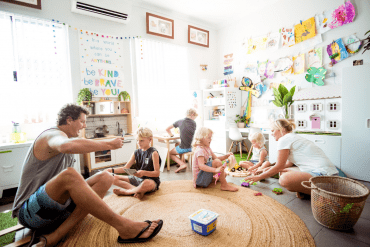By Genevieve Simperingham
We should ignore the child when they act out! – Or should we?
Parents are often urged to put their child in time out when they exhibit unwanted behaviour. When the child resists going to sleep and repeatedly gets out of bed, parents are advised to steer the child back to bed, while being careful to avoid eye contact, and keep the communication directive and minimal. Ignoring the child who is throwing a tantrum is generally recommended, or sending them to their room. Parents are warned to not reward negative behaviour with positive attention. We hear statements like “she’s just doing it to get your attention”; the logic being that denying the child positive attention will teach them that acting out isn’t going to get them what they want.
Time out is a popular approach, which essentially uses the child’s instinctive fear of separation and rejection as leverage in controlling their behaviour. Many teenagers have come to expect the silent treatment when they’ve stayed out past their curfew. Again, parents are often advised to say nothing, just take action; take back the car keys, then don’t engage when the teen opens the argument.
Ignoring a child and refusing to interact gives them a loud and clear reflection of their parent’s disapproval of the behaviour. Yet one of the problems is that when a breakdown of communication happens in the parent child relationship, even temporarily, it causes kids of all ages distress, yet the child receives little reassurance that their parent is tuning in to their feelings, thoughts and emotional needs.
Show them who’s boss! Parents will staunchly tough it out and not give in to their child’s pleas to move freely again, to be picked up or held, to be answered, to be given eye contact, all in the belief that they’re teaching their child that they can’t get away with bad behaviour. Then afterwards, the child is further blamed when told how their actions gave the parent no other choice but to punish.
But more and more, parents are realizing that banishing their child to their room, or a step, or otherwise excluding them and refusing to respond to them actually doesn’t feel very good and indeed, goes against the parent’s better instincts.
Unpacking the hidden messages. We’re now in a very exciting age and stage of evolution where we have the huge advantage of a wealth of information in child development, including attachment theory, which is essentially the science of parent child dynamics. One of the principle concepts that attachment research presents repeatedly is that the child’s instinctive attachment behaviour to seek proximity and comfort from their caregiver kicks in in stressful situations. And the parent being available as a source of comfort and security when the child needs them is right at the core of the child developing secure attachment. Having their needs to be cared for repeatedly met helps the child build a secure and positive sense of themselves and their world. Parents are reassured that their child seeking to be held and heard when upset is a normal and positive indicator of emotional health. Professor of Social Work, David Howe states in his book Attachment Across The Lifecourse that: “Securely attached children approach their carers directly and positively, knowing that their distress and upset will be recognized.”
Does time out work? Debates around different forms of discipline tend to centre a lot around what does and doesn’t work. Yet, in using rejection, isolation or withdrawal of attention as a tool to modify the child’s behaviour, we need to enquire further than “does it work?” It’s worth really unpacking some of the messages that we’re conveying to the child in using these discipline tools. Are we not bartering with a currency of attention, connection and responsiveness, and how will this serve or limit them in their current and future relationships with significant others. What might be the deeper and longer term effects of giving the child the very clear message: “if you act in these positive ways, then I’ll be warm, communicative, loving and responsive to you, but if you act in these negative ways, then you’ll be denied warmth, and I’ll be cold, stern, withholding and staunch until your allotted time is up, or you express some form of “remorse””.
Peaceful parenting, on the other hand, sees punishments to be counter-productive, and instead focuses on better managing our own frustrations and reactions, while supporting our children to identify and develop healthier ways of expressing their frustrations, and building skills like problem solving to remedy the situation. Time out often allows the parent to put on the brakes, yet we can learn to stop and step out of the intensity of a conflict and do some breathing or self-soothing to bring ourselves back to calm, while teaching our child to do the same: “OK I’m very angry and I just need to take three minutes to calm down”.
To be understood instead of punished, to express anger and not to be rejected, to complain and be taken seriously ….. Such experiences may be for later childhood what sensitive responsiveness to the baby’s cries and other distress signals are for infancy.” – Robert Karen in Becoming Attached.
Being a role model is a big responsibility. As a parent, I’ve always found it a really helpful, if not challenging, guiding light to remember that however I speak to and treat my kids is basically giving them my approval that this is an acceptable way of communicating with people in general. Of course, we all sometimes speak and act in ways that we regret, and as long as we have the self-awareness and humility to identify and admit our mistakes, our kids do learn the difference. When we admit that our communication was unkind and unhelpful and empathise with how it may have affected our child, then we give them the message “actually that was a really bad choice and I regret it”. But when we say something like “well I’m sorry but I wouldn’t have yelled if you had done what you were told”, then we give the message that “yeah, yelling is something that we’re allowed to do when the other person isn’t cooperating with us, or is being unkind”.
See next page for the rest…











